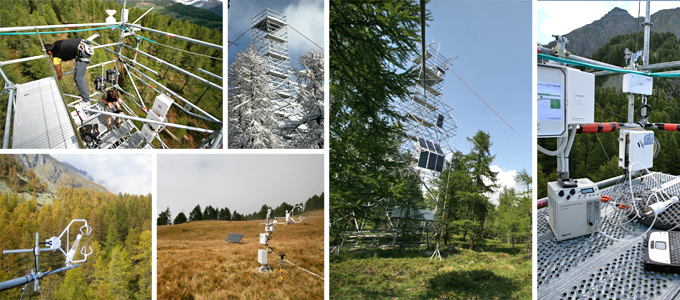The current increase in atmospheric CO2 concentration, due to human activities, is one of the major responsible of the observed global warming. A percentage (~60%) of the anthropogenic emitted CO2 is captured by ocean and land ecosystems. CO2 enters the ecosystems via photosynthesis – in turn, a fraction of this carbon, is released by the ecosystem respiration back to the atmosphere. The imbalance between photosynthesis and respiration is termed net ecosystem CO2 exchange (NEE) and allows to identify the source or sink role of an ecosystem.

Understanding the amount of CO2 the ecosystems take up from the atmosphere and monitoring how this process is influenced by climate is very important: with the global warming, will the ecosystems continue to mitigate anthropogenic CO2 emissions or their sequestration service will change? In this framework ARPA started in 2008 the monitoring of CO2 fluxes in a larch forest and a subalpine grassland, two ecosystems representative of this alpine region.
Measurements are carried on with the eddy covariance method which is a micrometeorological technique that assesses gas exchanges across the ecosystem/atmosphere interface by measuring the covariance between vertical wind velocity and gas mixing ratio. This technique provides accurate and continuous measurements of the net ecosystem CO2 exchange (NEE) at an appropriate (ecosystem) spatial scale.
In particular we are interested in:
We use cookies on our website. Some of them are essential for the operation of the site, while others help us to improve this site and the user experience (tracking cookies). You can decide for yourself whether you want to allow cookies or not. Please note that if you reject them, you may not be able to use all the functionalities of the site.
